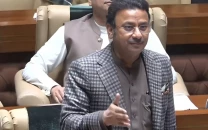Happily married

Happily married
Had some foreigner plugged in to the country in recent months, they would have observed this institution of marriage, hovering silently over the land, like an airborne Imran Khan — on the surface benign but really quite twisted. An immense glimpse was first provided by MPA Samina Khawar Hayat who in the Punjab Assembly, immortally some might say, put forward the suggestion that husbands need not seek permission from their wife before remarrying. The suggestion was, in fact, a proposed solution on a motion concerning the hiring of unmarried women into government. The original dilemma was on the fate of women in Punjab who are unmarried because of financial constraints and of the millions, apparently, spent by rich men on carrying out their affairs.
Daily peeks are also available through the relentlessness of television. So many dramas currently on air seem essentially to be one and the same cocktail of marriage, with Asif Raza Mir, Faisal Qureishi, Maria Wasti fiddling around, mixed in marginally different ways. Two wives, one rich husband, living together, ex-loves, one younger wife, one older, children, some abuse, some redemption, heavy dialogue, heavier looks — how will they all cope?
The cacophonic, unending backdrop to all this, of course, is the mess Shoaib Malik found himself in, in Hyderabad, with a woman he will now marry and a woman he said he wasn't married to but gave a divorce to anyway. Perhaps he should seek Raza Mir for marital advice. The grand culmination came in a recent primetime news bulletin of a leading channel, devoting half an hour to the third marriage of Adnan Sami Khan (as poor an advert for marriage as for liposuction) and Malik and Sania Mirza’s dance practice for their mehndi.
What is all this, if not madness? Female parliamentarians promote polygamy whilst the TV limits marriage – a deeply layered, incredibly complex and unique relationship – to two dimensions of infidelity and polygamy. Not even divorce, which is a far more interesting by-product of evolution, of humans and relationships, as well as, perhaps, a comment on tolerance and our growing lack of it.
There is something so wrong-headed about having more than one wife in today’s world it hardly merits saying. Yet it must be said, as so many other things, such as not blowing yourself up along with hundreds of others, or that red lights are for stopping. In what circumstances can it be right to have two, three or four wives at once anymore?
Mukhtaran Mai became the second wife of the constable assigned to protect her and heartening though it was, it was simultaneously unsettling. She agreed to it only after he attempted suicide and threatened to divorce his first wife: a modern-day folk romance, but written by Woody Allen. Is it not easier, and altogether more wholesome, to try and improve the lot of women than to marry them off as second wives, if that is what we are trying to do.
If religion is to have a say, then Islam does not forbid more than one wife, that much is correct. But that is not the same as encouraging it, a little like smoking. There is a thin line, but we have, as usual, blurred it and erred on the side of the Arabs, which is almost always precisely the wrong side to err on. In any case, it is not a thing of religion here, but a cultural trait and the simple way to the right path is to ask ourselves this: do we really want to be in the illustrious company of men such as Baitullah Mehsud?
Still, at least – and this is not said often – we can point to our president with heads high and not, say, South Africa’s Jacob Zuma and the many first ladies he brings to the table.



















COMMENTS
Comments are moderated and generally will be posted if they are on-topic and not abusive.
For more information, please see our Comments FAQ